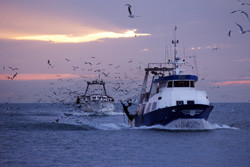Better policies for better fishing
As the world's resources become scarcer, the EU is looking at how effective government intervention is in conserving renewable natural resources. Indeed, governments have been successful, for example, in partly conserving fish stocks but not as successful in managing certain forests. Evidence shows that government intervention is very much affected by social norms and biological complexity, which are crucial determinants in furthering resource management. Against this backdrop, the EU-funded project 'Social complexity in resource management' (SOCORM) investigated how decisions of resource users are influenced by the biological and institutional environment. It looked at how social norms related to resource exploitation evolve, how these social norms react to environmental changes, and how government intervention can address resource management. The project team noted that while social cooperation to address resource management in a given community could be successful, it could also slowly erode or even suddenly collapse. SOCORM therefore examined how individual agents are often tempted to overexploit the resource and how this differs from cooperative harvesting of resources. This involved looking at catastrophic transitions from strong cooperation to serious norm violation that could collapse the socio-ecological system. Focusing on fish stocks and coastal communities, the project team then examined how social and ecological complexity mutually influence each other, and when to expect a sudden collapse. The vicious cycle between environmental degradation and socioeconomic instability was also examined. Lastly, SOCORM studied how policymaking could best integrate biological and social complexity in north-east Arctic cod fisheries. It took into consideration the current harvest control rule (HCR) and alternative HCRs to identify factors for success, examining as well social complexity of stakeholders involved. Within the policymaking arena, the project team also considered biological complexity such as genetic changes caused by intensive fishing and harvesting. The new insights emerging from the project have been published in notable academic journals and stand to benefit policymaking on a government level, rendering the fishing industry more sustainable. The findings could positively affect cod stock not only in Europe but in the rest of the world as well.







